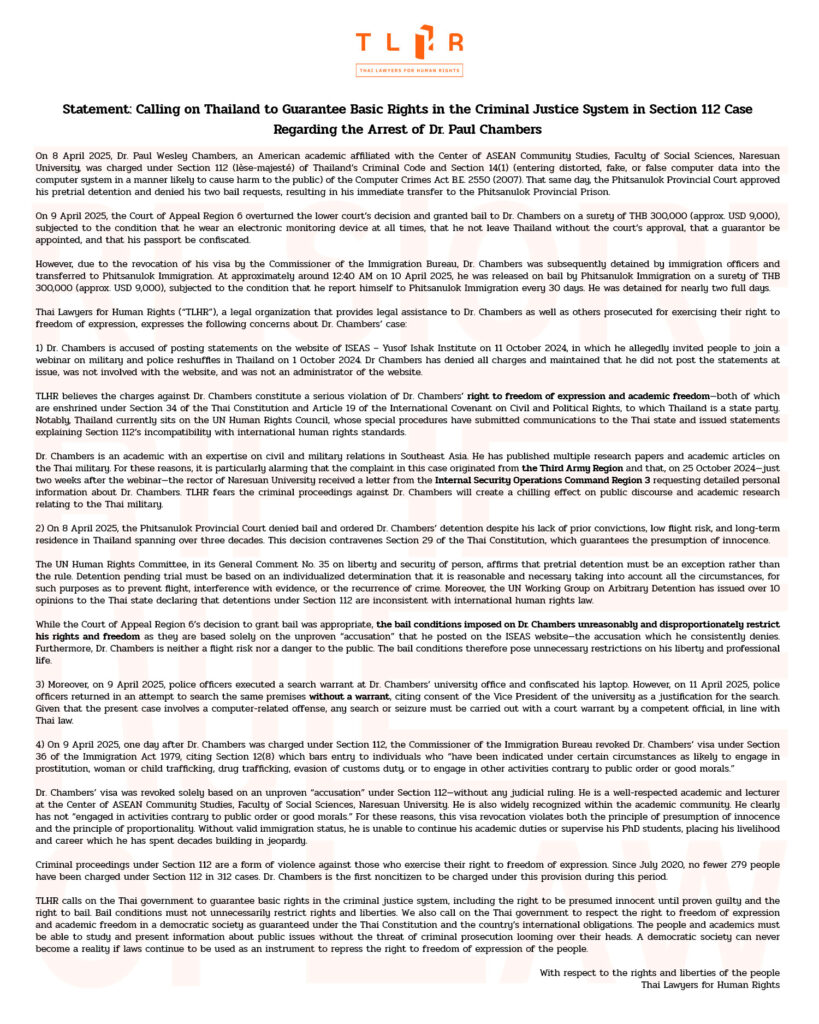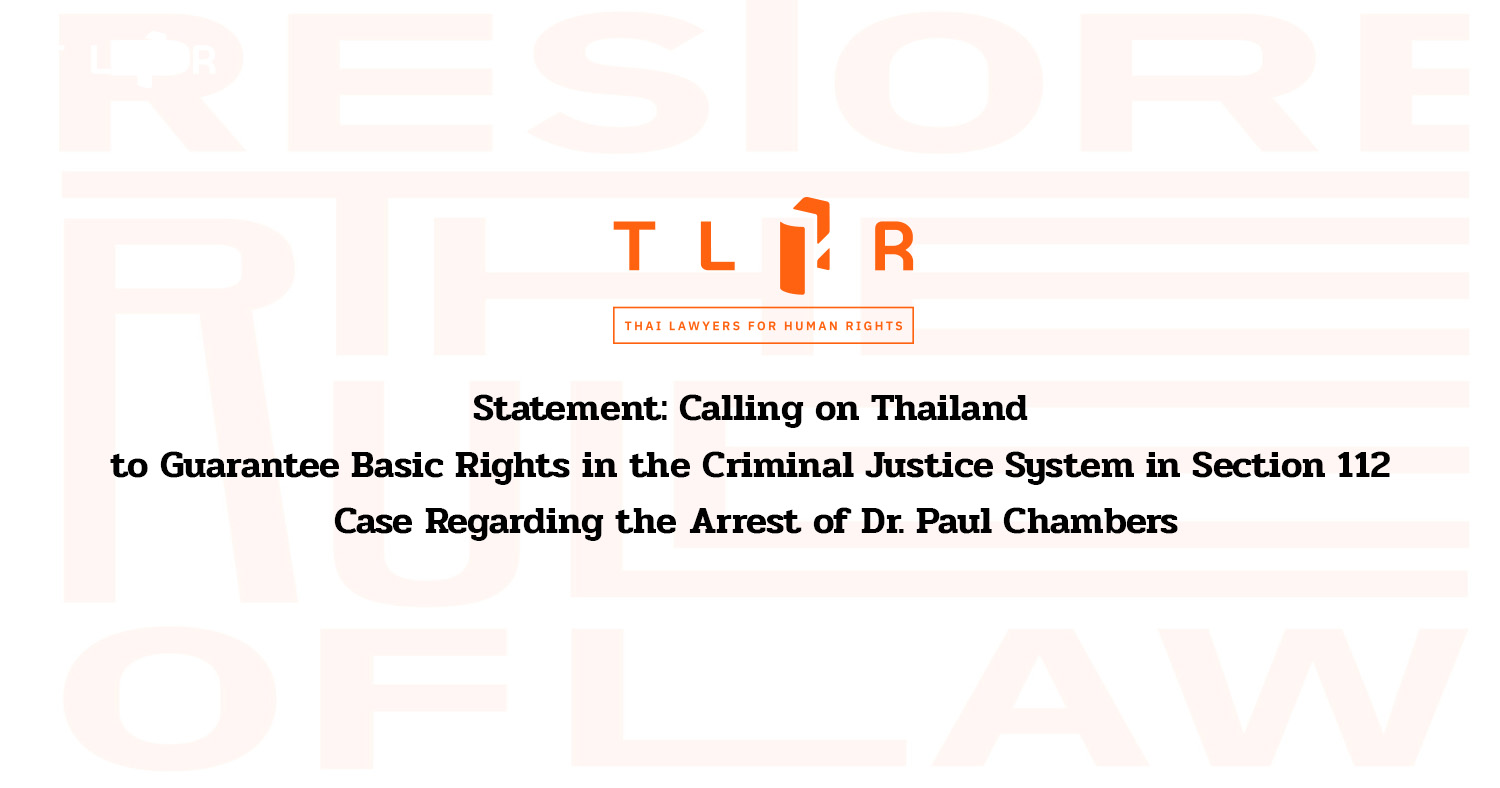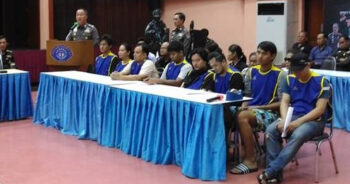On 8 April 2025, Dr. Paul Wesley Chambers, an American academic affiliated with the Center of ASEAN Community Studies, Faculty of Social Sciences, Naresuan University, was charged under Section 112 (lèse-majesté) of Thailand’s Criminal Code and Section 14(1) (entering distorted, fake, or false computer data into the computer system in a manner likely to cause harm to the public) of the Computer Crimes Act B.E. 2550 (2007). That same day, the Phitsanulok Provincial Court approved his pretrial detention and denied his two bail requests, resulting in his immediate transfer to the Phitsanulok Provincial Prison.
On 9 April 2025, the Court of Appeal Region 6 overturned the lower court’s decision and granted bail to Dr. Chambers on a surety of THB 300,000 (approx. USD 9,000), subjected to the condition that he wear an electronic monitoring device at all times, that he not leave Thailand without the court’s approval, that a guarantor be appointed, and that his passport be confiscated.
However, due to the revocation of his visa by the Commissioner of the Immigration Bureau, Dr. Chambers was subsequently detained by immigration officers and transferred to Phitsanulok Immigration. At approximately around 12:40 AM on 10 April 2025, he was released on bail by Phitsanulok Immigration on a surety of THB 300,000 (approx. USD 9,000), subjected to the condition that he report himself to Phitsanulok Immigration every 30 days. He was detained for nearly two full days.
Thai Lawyers for Human Rights (“TLHR”), a legal organization that provides legal assistance to Dr. Chambers as well as others prosecuted for exercising their right to freedom of expression, expresses the following concerns about Dr. Chambers’ case:
1) Dr. Chambers is accused of posting statements on the website of ISEAS – Yusof Ishak Institute on 11 October 2024, in which he allegedly invited people to join a webinar on military and police reshuffles in Thailand on 1 October 2024. Dr Chambers has denied all charges and maintained that he did not post the statements at issue, was not involved with the website, and was not an administrator of the website.
TLHR believes the charges against Dr. Chambers constitute a serious violation of Dr. Chambers’ right to freedom of expression and academic freedom—both of which are enshrined under Section 34 of the Thai Constitution and Article 19 of the International Covenant on Civil and Political Rights, to which Thailand is a state party. Notably, Thailand currently sits on the UN Human Rights Council, whose special procedures have submitted communications to the Thai state and issued statements explaining Section 112’s incompatibility with international human rights standards.
Dr. Chambers is an academic with an expertise on civil and military relations in Southeast Asia. He has published multiple research papers and academic articles on the Thai military. For these reasons, it is particularly alarming that the complaint in this case originated from the Third Army Region and that, on 25 October 2024—just two weeks after the webinar—the rector of Naresuan University received a letter from the Internal Security Operations Command Region 3 requesting detailed personal information about Dr. Chambers. TLHR fears the criminal proceedings against Dr. Chambers will create a chilling effect on public discourse and academic research relating to the Thai military.
2) On 8 April 2025, the Phitsanulok Provincial Court denied bail and ordered Dr. Chambers’ detention despite his lack of prior convictions, low flight risk, and long-term residence in Thailand spanning over three decades. This decision contravenes Section 29 of the Thai Constitution, which guarantees the presumption of innocence.
The UN Human Rights Committee, in its General Comment No. 35 on liberty and security of person, affirms that pretrial detention must be an exception rather than the rule. Detention pending trial must be based on an individualized determination that it is reasonable and necessary taking into account all the circumstances, for such purposes as to prevent flight, interference with evidence, or the recurrence of crime. Moreover, the UN Working Group on Arbitrary Detention has issued over 10 opinions to the Thai state declaring that detentions under Section 112 are inconsistent with international human rights law.
While the Court of Appeal Region 6’s decision to grant bail was appropriate, the bail conditions imposed on Dr. Chambers unreasonably and disproportionately restrict his rights and freedom as they are based solely on the unproven “accusation” that he posted on the ISEAS website—the accusation which he consistently denies. Furthermore, Dr. Chambers is neither a flight risk nor a danger to the public. The bail conditions therefore pose unnecessary restrictions on his liberty and professional life.
3) Moreover, on 9 April 2025, police officers executed a search warrant at Dr. Chambers’ university office and confiscated his laptop. However, on 11 April 2025, police officers returned in an attempt to search the same premises without a warrant, citing consent of the Vice President of the university as a justification for the search. Given that the present case involves a computer-related offense, any search or seizure must be carried out with a court warrant by a competent official, in line with Thai law.
4) On 9 April 2025, one day after Dr. Chambers was charged under Section 112, the Commissioner of the Immigration Bureau revoked Dr. Chambers’ visa under Section 36 of the Immigration Act 1979, citing Section 12(8) which bars entry to individuals who “have been indicated under certain circumstances as likely to engage in prostitution, woman or child trafficking, drug trafficking, evasion of customs duty, or to engage in other activities contrary to public order or good morals.”
Dr. Chambers’ visa was revoked solely based on an unproven “accusation” under Section 112—without any judicial ruling. He is a well-respected academic and lecturer at the Center of ASEAN Community Studies, Faculty of Social Sciences, Naresuan University. He is also widely recognized within the academic community. He clearly has not “engaged in activities contrary to public order or good morals.” For these reasons, this visa revocation violates both the principle of presumption of innocence and the principle of proportionality. Without valid immigration status, he is unable to continue his academic duties or supervise his PhD students, placing his livelihood and career which he has spent decades building in jeopardy.
Criminal proceedings under Section 112 are a form of violence against those who exercise their right to freedom of expression. Since July 2020, no fewer 279 people have been charged under Section 112 in 312 cases. Dr. Chambers is the first noncitizen to be charged under this provision during this period.
TLHR calls on the Thai government to guarantee basic rights in the criminal justice system, including the right to be presumed innocent until proven guilty and the right to bail. Bail conditions must not unnecessarily restrict rights and liberties. We also call on the Thai government to respect the right to freedom of expression and academic freedom in a democratic society as guaranteed under the Thai Constitution and the country’s international obligations. The people and academics must be able to study and present information about public issues without the threat of criminal prosecution looming over their heads. A democratic society can never become a reality if laws continue to be used as an instrument to repress the right to freedom of expression of the people.
With respect to the rights and liberties of the people
Thai Lawyers for Human Rights
Remark: This statement was updated on 13 April 2025



